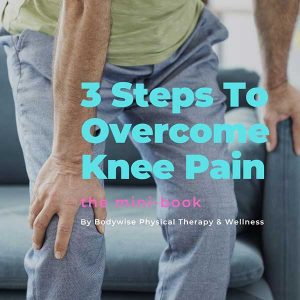
Running and its Impact on Your Body
What Can Running Do To Your Body?
This question is always asked with a negative implication. But you will be surprised to learn the number of positive effects running has on your body! Running has evolved greatly in the past 50 years to become a sport, a hobby, exercise, and a lifestyle. Running as a sport has been around since ancient Greece, but it was not until sports were broadcast on TV that running became a thing. The 1960s and 70s showed a huge surge of people getting into the sport helped by the advent of new shoes, books, and merchandise. As more people took to the sport, more people realized that you should be running for your health.
We will examine some of the most frequently asked questions about running at Bodywise Physical Therapy. Scan the questions and answers below to identify any questions you may have. If we haven’t answered them, comment below, and we will keep updating the list.
How many miles per week should I run?
This depends on many factors, such as experience, health, and training. However, research has shown that any amount of running, no matter how short, will result in improved health. A 2014 study showed that weekly running, even <51 minutes, <6 miles, 1 to 2 times, or <6 miles/h, helped reduce mortality risk, compared with not running. The same study showed that people who ran for less than 1 hour per week benefited as much as those who ran more than 3 hours per week (reducing the risk of heart events and improving mortality rates.) This study was important because it also showed that being more consistent with your running is more important than how fast, how far, or how many miles you should run each week. The short answer is that any amount of running can improve your health compared to not running at all! But be careful about overexerting yourself.
How many miles per week of running is considered too much?
A 2020 study examined the effects of physical activity on the body and found that engaging in very high doses of strenuous exercise over a long period may reduce the protection against early mortality and cardiovascular disease that running every week will provide. It is recommended to limit vigorous exercise (such as heart-pounding and sweat-producing activities) to a maximum of 4 to 5 cumulative hours per week, especially for individuals over 45 years of age. This same study reported that light to moderate physical activity did not have a weekly limit! This means that light to moderate running, walking, or other physical activities do not have a limit at this time.
Can I lose weight by running?
Yes! A recent study involving over 1200 runners found that running >21.5km a week showed significant changes in body mass, body fat, and visceral fat within the group. Another study showed that running >5km a week would produce positive changes in weight loss over a year. This study also stated that running in combination with diet was more effective, resulting in a greater weight loss over a year.
How many times per week can I run?
You can run as many as 6 times a week with average training routines. This will allow your body to not only rest but also grow and repair muscle. If you are approaching 4-5 combined hours a week of vigorous running, you should start limiting your running, especially if you are over 45 years old. If you’ve had an injury or have health concerns, consult with your doctor or physical therapist to find the right level of activity for your body.
Can I get in shape by running?
If getting in shape means lowering your risk for cardiac disease and living longer, then yes. Running short distances at slow paces consistently every week will considerably reduce your risk for a cardiac event. Surprisingly, this study showed the best health benefits with light to moderate running. The key factor is the consistency of your weekly running regimen. If you are looking to tone your butt or get abs by running-keep reading.
Can I lose belly fat by running?
Yes, you will see positive changes in your body mass, body fat content, and total visceral fat when you run consistently. These changes will be faster and more significant when you combine running with a consistent diet. The scientific data now points to running >5km a week to show improvement, but you will see changes regardless of your running distance when you go from inactive to active.
Can I get abs by running?
Running will improve the strength of your abdominal muscles due to the trunk stabilization needed during running and increased breathing needs. However, very little research points to running alone producing enough of a muscular load to develop toned abdominal musculature. In fact, there is more research that points to needing to strengthen your abdominal musculature to improve your running. You must rely on more traditional abdominal exercises rather than running alone to get abs.
Can I run every day?
Your body needs at least one day a week to rest, repair, and replenish what has been depleted by activity.
Does running tone your butt?
The short answer is yes, running will tone your butt. In addition, running will result in higher gluteal (butt) muscle activation than walking alone. A lack of gluteal strength due to running faults and imbalances will result in poor recruitment of the gluteal muscles. This poor recruitment will lead to lower leg injuries like iliotibial band syndrome, patella femoral pain, and back discomfort. Surprisingly, just exercising the gluteal muscles does not always reduce these problems. It takes a running technique change to help the runner engage the glutes at the right time. What is the best way to tone your butt? Correct running technique in combination with glute strengthening exercises will tone your butt and improve your running effectiveness.
What does running do to your body?
Running consistently every week has many positive effects, so many that they will vastly outnumber any negative ones that may arise from this activity. Medical studies show that running will improve health and increase lifespan regarding cardiovascular and cancer rates. Running has been shown to decrease inflammation in our knees. Your mental health and self-confidence have also been shown to be positively affected by consistent running. Running will help you sleep better. Running will also help you lose weight. The body’s immune system also benefits from running. People who consistently run have a 29% lower risk of developing type 2 diabetes. With all this positive, there is a flip side. It is common for runners to become injured within the course of a year. However, many times, these injuries are due to runners increasing intensity or mileage too quickly. Running alone has not been shown to cause increased wear and tear of joints and muscles.
Ask Bodywise Physical Therapy.
If you have questions about running or an injury that prevents you from being active, reach out. At Bodywise Physical Therapy in Epping & Stratham NH we are happy to help get you back to activity quickly!




















Comments 4
Very encouraging article on continuing to run! I’ve been looking for articles regarding training for a half marathon for someone who is, ahem, over the age of 45 🙂
Wow, superb weblkog layout! How long have you been running a blog for?
Pingback: Do runners really need strength training? - Bodywise
Outstanding piece!